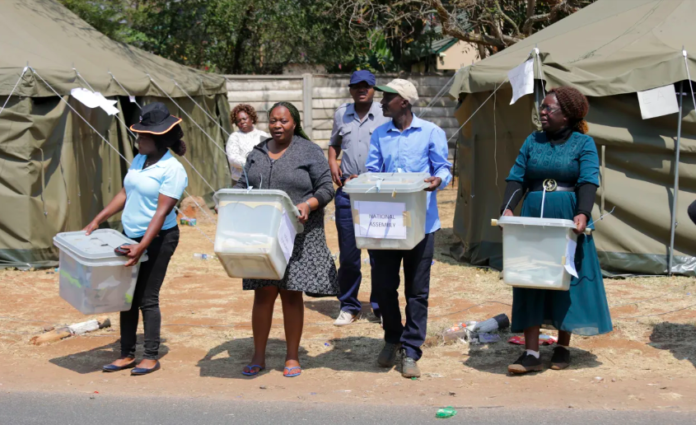By Reuters
HARARE, – The first constituency results emerged on Thursday in Zimbabwe’s election after delays forced a second day of voting in a small number of neighborhoods and civil society activists were arrested.
Zimbabweans voted for president and lawmakers on Wednesday, with many expressing hope for change after years of economic hardship. But analysts warned it was unlikely the ruling ZANU-PF party would allow any loosening of its 43-year grip on power.
Fewer than 10 of 210 parliamentary constituencies had results on Thursday, making it too early to identify any national trend. Results in the presidential race were not expected for another day or two but before a five-day deadline.
Voting was extended on Thursday in 40 wards, which are the size of neighborhoods, representing fewer than 1% of the total 12,374. The electoral commission said the cause was late printing of ballot papers after court challenges but gave no further details.
President Emmerson Mnangagwa, 80, who took over from longtime strongman Robert Mugabe after a 2017 coup and won a disputed election in 2018, was seeking a second full term.
His main challenger was the same as last time: Nelson Chamisa, 45, of the Citizens Coalition for Change.
Mnangagwa’s re-election bid comes after years of runaway inflation, steep currency depreciation and soaring joblessness that have left many Zimbabweans dependent on US dollar remittances from relatives overseas.
Despite widespread dissatisfaction with the government, analysts said the electoral playing field was heavily skewed in favor of ZANU-PF, which has a long history of using state institutions to manipulate elections in its favor.
Foreign lenders and donors have said a free and fair election was a precondition for any talks to help Zimbabwe resolve a debt crisis and access World Bank and International Monetary Fund loans.
The government and the electoral commission have said the election would be clean.
DELAYS AND ARRESTS
Police said they had detained 41 people and seized cell phones, laptops and other electronic equipment during raids on four locations in Harare following a tip-off concerning “subversive and criminal activities”.
“The equipment was being used to unlawfully tabulate election voting statistics and results from polling stations throughout the country,” police spokesman Paul Nyathi said in a statement.
The police named some of the organizations targeted as the Zimbabwe Election Support Network, Election Resource Centre and Team Pachedu – all well-known civil society groups that had said they were monitoring the vote in the interests of democracy.
Zimbabwe’s political opposition and independent analysts have long accused the police of partisan conduct, with opposition rallies often being banned or dispersed and figures critical of the government arbitrarily arrested. The police reject the allegation of bias.
Reuters reporters who went to two wards on Thursday where the voting was extended said there was very little activity at the polling stations. It was unclear whether voters had not heard the stations were open, had given up or had voted already.
Eldred Masungure, a lecturer in political science at the University of Zimbabwe, said the confusion would jeopardize the integrity of the election and of the electoral commission.
“In the affected wards, we witnessed what amounts to an institutional disaster,” he said. “That injury has been addressed somewhat but not everyone will have the time nor the resources to vote today.”
By Nelson Banya and Nyasha Chingono
(Writing by Estelle Shirbon; Editing by Angus MacSwan, Miral Fahmy and Devika Syamnath) Daily Maverick














